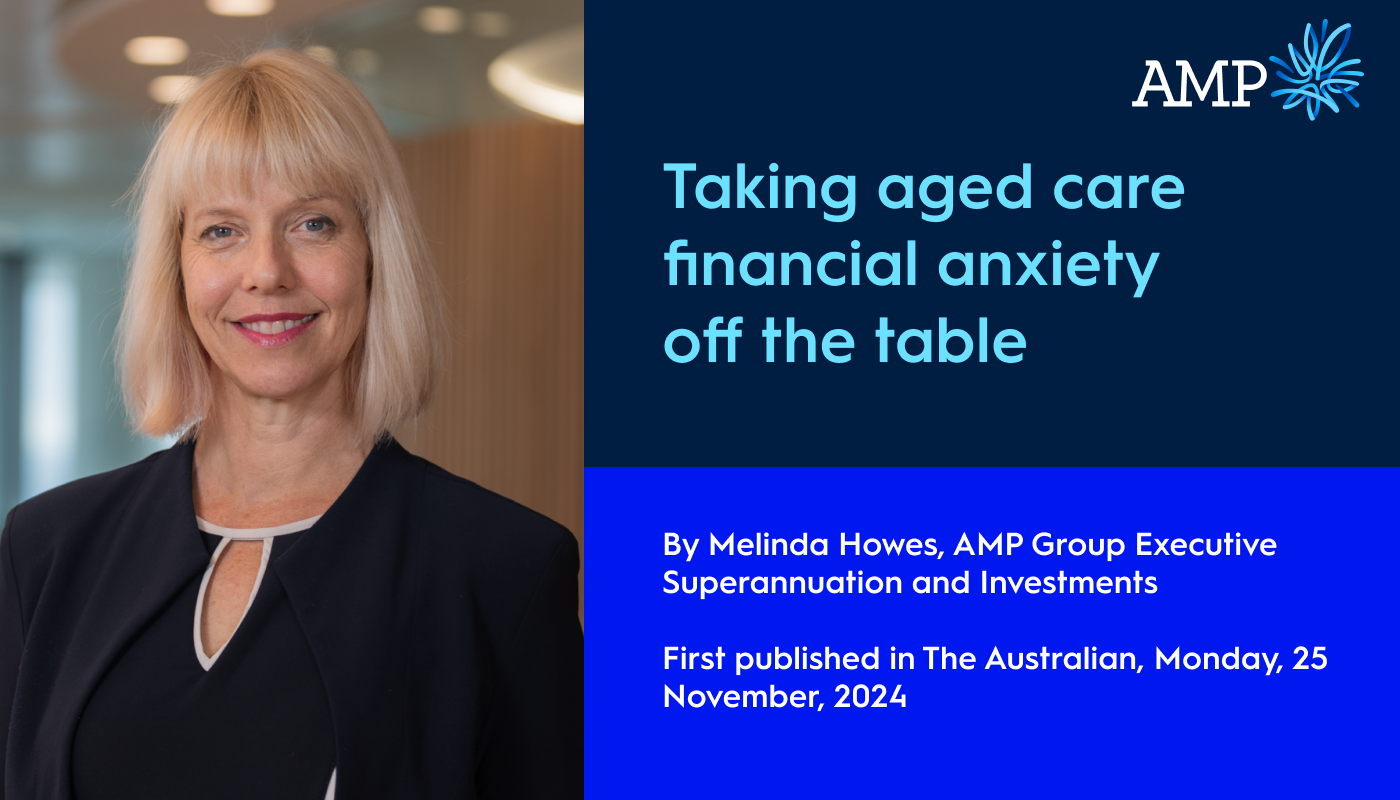Research findings from AMP won’t come as a surprise to older Australians considering aged care, or the families and loved ones providing support during this challenging and emotional phase of life. They also highlight why the Government’s proposed reforms for the retirement phase of super, announced last week, must translate into action.
Seven in ten Australians aged 65 and over worry about the cost of aged care, and four in five feel unprepared for a potential transition. Meanwhile, half don’t understand what government assistance is available to them.
This uncertainty and trepidation about aged care – particularly the financial aspects – are indicative of the lack of financial confidence far too many Australians still experience in retirement. Retirees who better understand the system and feel secure about their financial future will naturally be less concerned about the financial implications of aged care.
Industry and Government must intensify efforts to build retirees’ financial confidence. The new Aged Care Act, currently making passage through parliament, will help ensure greater optionality and dignity for those requiring care, easing some affordability worries. But it needs to work in concert with a broader suite of measures for retirees, so that financial concerns around aged care can be taken off the table. Families shouldn’t be preoccupied with finances at this stage of life; emotional and physical well-being must take precedence.
Australia’s demographic trajectory presses home the issue. By 2058, our population aged 85 and over is projected to triple to over 1.5 million. This doesn’t include the millions of family members and loved ones providing support to the elderly.
The reality – and good news – is that most shouldn’t need to worry about the cost of aged care, or that their retirement savings will run out. The relative wealth of Australian retirees is considerable, buoyed by a strong superannuation system and the significant value uplift of their homes in the last three decades. This is reflected in Productivity Commission findings that an estimated $3.5 trillion is set to be transferred by Australians aged 60+ over the next two decades, largely due to the high homeownership rates among retirees.
Unfortunately, many Australian retirees perceive themselves as financially vulnerable. As the Retirement Income Review found, large numbers are passing away with the majority of the nest eggs they had at retirement intact and unspent, fearful that their savings won’t last. Many avoid drawing down on their assets, opting instead for caution. This is having a knock-on effect to mental health, with a 2020 survey by National Seniors Australia finding that financial insecurity in retirement is a significant driver of mental health concerns among older Australians.
The root cause of this financial fear is uncertainty and a fundamental lack of understanding of our retirement and pension systems, which research confirms most Australians find confusing and complex. This is amplified by the inherent uncertainty we all have about how long we’ll live, and what care we’ll require in later life. But it’s also not helpful that a significant portion of retiree wealth is effectively locked up in the family home, with downsizing disincentivised by the pension means-testing system.
As a superannuation industry, we’ve also let Australians down. Focused on the accumulation side of the system, we’ve failed to innovate and offer the products and support required to give retirees lifetime financial confidence. A shrinking financial advice industry in recent years, amid intense regulatory scrutiny, also hasn’t helped.
From these problems, however, we can identify clear solutions. Firstly, as they have done with the forthcoming Aged Care Act, Government must actively look to simplify and improve the financial system in retirement. There is, for example, opportunity to create a single age pension means test to cover both income and assets. This would encourage downsizing, but also stimulate more product innovation to unlock retiree income from the family home, without the need to vacate.
Reforms which support more accessible financial advice are essential, including rapid implementation of the now long-standing Quality of Advice recommendations. Recognising that not everyone requires comprehensive financial advice, superannuation funds must also step up with more sophisticated retirement support and intra fund advice for their members. This help should start well before retirement age, so members can commence their post working lives with a sound understanding of the system and their financial circumstances. This will enable a long-term financial plan to be put in place that covers potential aged care costs, but also support a better quality of life throughout retirement.
We’re seeing more superannuation funds come to market with digital advice solutions, but these offers need to be more intuitive and comprehensive across investment management, income projections and scenario planning, factoring in aged care, social security entitlements, and the transition to retirement. Importantly, these digital solutions need to be integrated with human support, for which there will never be a full substitute.
Additionally, as outlined by the Government’s latest consultation, superannuation funds must provide more effective lifetime income solutions for their members. These must be easily understood and supported by education through the digital advice process. Critically, they must also interact cohesively with both the age pension and care systems, so that Government benefits are maximised.
Aged-care anxiety is symptomatic of the financial insecurity which continues to unnecessarily plague the quality of life of too many Australian retirees. This is despite our nation’s decades of economic prosperity and world class accumulation system. Industry and Government must do more to unlock financial peace of mind for retirees, particularly in the later stages of life.
First published in The Australian, Monday, 25 November, 2024


